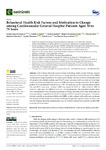2022-05-07Zeitschriftenartikel
Behavioral Health Risk Factors and Motivation to Change among Cardiovascular General Hospital Patients Aged 50 to 79 Years
Siewert-Markus, Ulrike
Ulbricht, Sabina
Gaertner, Beate
Zyriax, Birgit-Christiane
Dörr, Marcus
Tobschall, Stefanie
Baumann, Sophie
John, Ulrich
Freyer-Adam, Jennis
Little is known about the (co-)occurrence of smoking, alcohol at-risk drinking, physical inactivity and overweight, and the motivation to change these behavioral health risk factors (HRFs) in older general hospital patients with cardiovascular disease. Between October and December 2016, all consecutively admitted patients aged 50 to 79 years were proactively recruited on 3 cardiology wards and asked to participate in a survey on HRFs and behavior change motivation. Of the eligible patients, 80.4% participated in the survey (n = 328). The mean age was 66.5 years (standard deviation 9.0), and 65.5% were male. At least 1 HRF was present in 91.8% (n = 280), at least 2 HRFs in 54.4% (n = 166), and 3 or 4 HRFs in 12.1% (n = 37) of participants. The proportion of older adults who contemplated or were changing or planning to change their behavior to meet health behavior recommendations ranged between 66.0% (smoking) and 93.2% (alcohol consumption). The results indicate a notable co-occurrence of behavioral HRFs in older patients with cardiovascular disease. The majority of older adults were at least considering changing the respective behavior. To prevent and treat diseases efficiently, hospitalization may be a suitable moment for systematic multiple HRF screening and intervention.
Files in this item

